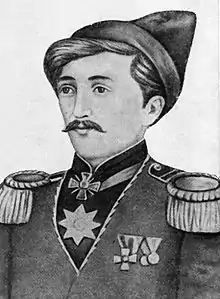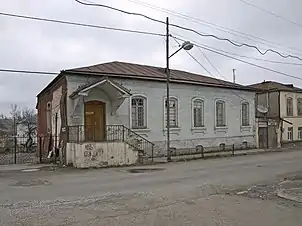Abbasgulu Bakikhanov
Abbasgulu agha Bakikhanov[lower-alpha 1] (Azerbaijani: Abbasqulu ağa Bakıxanov) (21 June 1794, Amirjan – 31 May 1847, Wadi Fatima, near Jeddah), Abbas Qoli Bakikhanov,[3][lower-alpha 2] or Abbas-Qoli ibn Mirza Mohammad (Taghi) Khan Badkubi[4] was an Azerbaijani writer, historian, journalist, linguist, poet and philosopher.
Abbasgulu Bakikhanov | |
|---|---|
Abbasqulu Bakıxanov | |
 | |
| Born | June 21, 1794 |
| Died | May 31, 1847 (aged 52) |
| Other names | Qodsi / Qudsi / Gudsi |
| Occupation(s) | writer, historian, journalist, linguist, poet and philosopher |
| Known for | Father of Azerbaijani historiography |
| Parent |
|
He was son of the third khan of Baku Mirza Muhammad Khan II. He later served as an officer in the Imperial Russian Army and participated in the Russo-Persian War of 1826–1828. He later retired and settled in Quba.
Also known by his pen name Qodsi / Qudsi / Gudsi (Azeri: Qüdsi), many Azerbaijani scholars view Bakikhanov as among their first thinkers and historians.[5] He is credited with being the first person that wrote a "scholarly monograph on the history of greater Shirvan"; the area that would later make up most of the Republic of Azerbaijan.[6] His Qanun-e Qudsi, was the first Persian grammar manual published.
Early life

Bakikhanov was the son of the 3rd khan of Baku, Mirza Muhammad Khan II and a Georgian woman named Sofia. In 1813, seven years after the loss of the khanate's sovereignty, the family moved to Quba, where over the next ten years, he learned Arabic, Turkish, and Russian, followed later by French and Polish.[7] In 1818, he established the first Azeri literary society Gulistan-i Iram. In 1820, he enlisted in the Russian army as an interpreter and received a commission for taking part in suppressing a rebellion in the Kazikumukh Khanate (in southern Daghestan).
Political and diplomatic career
Bakikhanov was a member of the Russian diplomatic mission in charge of negotiating border issues between Russia and Persia in the 1820s. In 1823, he helped gather ethnographic information for the Description of the Province of Karabakh. In 1828, he was among the Russian military command under General Paskevich that took part in peace negotiations with Persia, which resulted in signing the Treaty of Turkmenchay. He convinced Khan Ehsan of Nakhchivan, as well as a number of Kurdish leaders of Persia to ally with Russia. In 1829 he was awarded the 4th Degree Medal of St. Vladimir for participating in the siege of Kars in the Russo-Turkish War of 1828-1829. For a while he served at the Russian Ministry of Foreign Affairs in Saint Petersburg. He retired in 1835 and returned to the village of Amsar near Quba.[8]
Career in education
Bakikhanov's religious views were generally liberal due to major European influences. He criticized fanaticism among the religious masses and the Obscurantism of the clergy. He promoted the Islamic culture in the region and in Russia as a whole. His ultimate goal was to establish a Muslim college in Baku and an Oriental languages school in Tbilisi. In 1832, he came up with a project for establishing a major educational institution for Muslims, where subjects would be taught in Russian, Persian, and Azeri. He went further, and wrote a number of textbooks through which students were expected to study. The project was sent to the governor of the Caucasus for approval but was disregarded. Bakikhanov also translated several fables by Ivan Krylov into Azeri, one of which survives. His greatest accomplishment in the field of education was writing Qanun-e Qudsi, the first Persian grammar manual published in history.[9]
Major works
- Riyadh al-Quds (The Holy Garden). Bakikhanov wrote his first book (in Azerbaijani) under religious influence from the Muslim communities of Quba. At the same time, Riyadh al-Quds was Bakikhanov's reflection piece on Shi'a mystic literature, such as Jila al-Uyun by Muhammed Baghir Majlisi.
- Gulistan-i Iram (The Blooming Flower Garden) is one of his major works (written in Persian) and dedicated to the history of the East Caucasus from Ancient Times to 1813. An English translation of this work has been made by Willem Floor and Hasan Javadi and published by Mage Publishers in 2009.[10]
- Ketab-e Asgariyyeh (The Book of Asgar) was Bakikhanov's first fiction book: a love story of two young people, persecuted by the fanatic society they lived in. The book was written in Azerbaijani language.
- Qanun-e Qodsi (The Holy Law) was the first book in history entirely dedicated to the grammar of the Persian language. Originally written in Persian in 1831, it was translated into Russian in 1841 and became one of the bases for the development of iranistics in Russia.
- Mishkat al-Anwar (The Cresset Niche). This book is an almanach of fables, parables, as well as some quotes from the Qur'an and references to Sufi mysticism overall aimed at preserving social values and morals within society. The book was written in Persian.
- Kashf al-Qaraib (The Discovery of the Unknown) was one of the school books written by Bakikhanov in the early 1830s in Persian, where he describes the discovery of the Americas.
- Asrar al-Malakut (The Secrets of Heavens) is an introduction to astronomy, written in Arabic.
Other works include Umumi Joghrafya (General Geography), Kitab-i Nasihat (The Book of Admonitions), etc., scientific essays, collected poems, articles, translations of various works into Azeri and Russian, etc.
Death
In 1845, Bakikhanov went on a hajj. On his way to the holy Islamic sights, he was warmly received by the Shah of Persia and was awarded the Shir-e Khorshid, the highest-ranking Persian medal. There he also visited Isfahan, Yazd, Shiraz, and Kermanshah. In Constantinople, Bakikhanov had an audience with the Sultan, who showed interest in some of his academic writings, particularly in Asrar al-Malakut, of which he was presented a copy. From there, Bakikhanov went to visit Mecca and Medina. On his way from Medina back to Damascus he caught cholera and died in the small town of Wadi Fatima in Hejaz (present-day Saudi Arabia) in 1847.
Family
In 1826, Bakikhanov married Sakina (b. 1807) his paternal cousin and grandnephew of Fatali Khan, daughter of Kalb Huseyn agha, with whom he had two daughters[11] including Zibün Nisa Begüm, who married Hasan Bakikhanov)
Awards
- Order of Saint Anna 3rd class - 1 January 1828 (for participation in Yerevan and Sardarabad battles of Russo-Persian War)[12]
- Order of Saint Vladimir 4th class - 16 October 1828 (for the excellent courage and bravery shown in Russo-Turkish War and in the siege and capture of Kars)[12]
- Order of Saint Anna 2nd class - 1829 (for taking part in the battles on June 19 and 20, 1829 in the Saganlug mountains)[12]
- Order of Saint Anna 2nd class (version decorated with imperial crown) - 1829 (for participation in the battles on July 24, 1829 at Hart and September 27 at Bayburt)[12]
- Order of Saint Stanislaus 3rd class - 1829
- Order of the Lion and the Sun 1st class (with diamonds on a diamond chain) - 1829
Memory
- There is a municipality named after Bakikhanov in Baku.
- History institute of Azerbaijan National Academy of Sciences is named after Bakikhanov.[13]
- There is a street named after him in Nasimi rayon of Baku.
- In October 2011 Abbasgulu Bakikhanov's statue was unveiled in Baku, in the municipality of Baku named after Bakikhanov. The park Bakikhanov, where the monument is, was overhauled, and then the monument was erected there.[14]
- He was portrayed by Fakhraddin Manafov in 2012 film "Ambassador of Morning".[15]
 Bakikhanov's monument in Quba
Bakikhanov's monument in Quba Bakikhanov's house in Əmircan with his memorial plaque
Bakikhanov's house in Əmircan with his memorial plaque
Notes
- "Bakikhanov" derives from "Baku-Khanov". A Russified name.[2]
- Or "Abbas Qoli Aqa Bakikhanov".
References
- Gould, Rebecca Ruth (2019). "The Persianate Cosmology of Historical Inquiry in the Caucasus: ʿAbbās Qulī Āghā Bākīkhānūf's Cosmological Cosmopolitanism". Comparative Literature. 71 (3): 272–273. doi:10.1215/00104124-7546287. S2CID 165301161.
The present article develops this emergent area of inquiry through an examination of the writings, life, and legacy of the polymath Persianate intellectual ʿAbbās Qulī Āghā Bākīkhānūf (1794–1847). Bākīkhānūf came of age in an era of empire, in his case specifically of Russian incursions onto Qajar territory. While Bākīkhānūf was born into what was the Qajar empire, his place of birth was incorporated into the Russian empire with the Treaty of Gulistan (1813), ratified during his teenage years.
- Storey, Charles Ambrose (1970). Persian Literature: v.1: A Bio-bibliographical Survey. Luzac Publishing Ltd. p. 428. ISBN 978-0718901417.
by 'Abbas-QulI " Qudsi " Badkubi or Baku-Khanov.
-
- Floor, Willem M.; Javadi, Hassan. "The heavenly rose-garden: a history of Shirvan & Daghestan, by Abbas Qoli Aqa Bakikhanov", (Mage Publishers, 2009), p. vii; "Abbas Qoli Aqa Bakikhanov, also known under the pen-name Qodsi, was an Azerbaijani writer, historian, journalist, linguist, poet and philosopher. He was born on Thursday, the 4th Dhu'l-Hejjeh 1208 hijri, or the 10th of June in the year 1794 in the village of Amir Hajan near Baku. Bakikhanov was a scion of the ruling dynasty of the Khanate of Baku, being the nephew of the last khan of Baku. His father Mirza Mohammad Khan II was the ninth Khan of Baku and was (...)"
- Bournoutian, George A. "A Brief History of the Aghuankʻ Region, by Esayi Hasan Jalaleantsʻ", (Mazda Publishers, 2009), p. 10; "Even more irritating was the fact that Muslim historians, who had lived in the territory of what later became the Azerbaijan Republic, men like Abbas Qoli Aqa Bakikhanov Mirza Jamal Javanshir and Mirza Adigozal Beg, the first of whom was honored by the Academy of Sciences in Baku as the father of the history of Azerbaijan, had clearly indicated a strong Armenian presence in Karabagh prior to 1828 and had placed the region within the territory of historic Armenia."
- Storey, Charles Ambrose (1970). Persian Literature: v.1: A Bio-bibliographical Survey. Luzac Publishing Ltd. p. 428. ISBN 978-0718901417.
by 'Abbas-Quli "Qudsi" Badkubi or Baku-Khanov.
- Bournoutian 2004, p. 17, "The last source examined here is by ʻAbbas Qoli Aqa Bakikhanov (1794-1847), referred to by many Azerbaijani scholars as one of their earliest intellectuals and historians".
- Bournoutian 2004, p. 17.
- Studies on Qudsi Archived September 28, 2007, at the Wayback Machine by G.Bakikhanova (in Russian). Retrieved 29 August 2006
- Azeri Literature Archived September 28, 2007, at the Wayback Machine (in Russian). Fundamental Electronic Library The Russian Literature and Folklore. Retrieved 29 August 2006
- Floor & Javadi 2009, p. xiii.
- Willem Floor, Hasan Javadi(2009), "The Heavenly Rose-Garden: A History of Shirvan & Daghestan by Abbas Qoli Aqa Bakikhanov, Mage Publishers, 2009.
- Acts collected by the Caucasian Archaeological Commission: [In 12 vols.] / Archive of Chief Executive viceroy of the Caucasus; Under the Society. Ed. A. D. Berger. - Tbilisi: Typ. Ch. Ex. Viceroy Cau., 1866-1904. T. 6: Part 2: [1816-1827] / Ed. A. D. Berger. - 1875. - 941 p. — pp. 907-908
- Гусейнов, Гейдар (1958). Из истории общественной и философской мысли в Азербайджане XIX века (in Russian). Азербайджанское гос. изд-во. p. 122.
- "Tarix". tarix.gov.az. Archived from the original on 2017-05-15. Retrieved 2018-08-30.
- "В Баку воздвигнут памятник Бакиханову – ФОТО". 4 October 2011. Retrieved 6 November 2018.
- "Завершились съемки художественного фильма "Посол зари", посвященного Мирза Фатали Ахундову". LifeNews - Новости Азербайджана и Мира (in Russian). Retrieved 2018-08-30.
Sources
- Bournoutian, George A. (2004). Two Chronicles on the History of Karabagh (Mirza Jamal Javanshir's "Tarikh-e Qarabaq" and Mirza Adigozal Beg's "Qarabaq Nameh."). Costa Mesa, California: Mazda Publishers. ISBN 1-56859-179-9.
- Floor, Willem M.; Javadi, Hasan (2009). The heavenly rose-garden: a history of Shirvan & Daghestan, by Abbas Qoli Aqa Bakikhanov. Mage Publishers. ISBN 978-1933823270.
- Gould, Rebecca Ruth. "The Persianate Cosmology of Historical Inquiry in the Caucasus: ʿAbbās Qulī Āghā Bākīkhānūf's Cosmological Cosmopolitanism," Comparative Literature 71.3 (2019): 272-297".